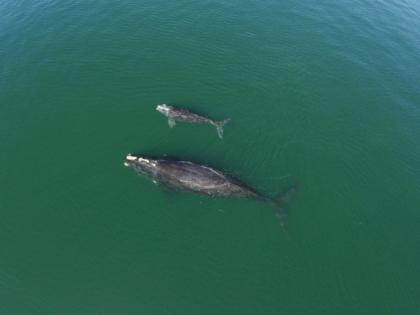How long do right whales live? Nearly twice as long as previously thought, study finds
Published in News & Features
Southern right whales can live to be more than 130 years old — which is decades longer than previously thought, according to new research.
The marine animals, a type of baleen whale found in the southern hemisphere, have the gift of “extreme longevity,” according to a study published on Dec. 20 in the journal Science Advances and an accompanying news release.
The study holds major implications for the species, which was hunted extensively until the mid-20th century and is now considered endangered.
The study
To reach their conclusion, researchers pored over photo identification data collected over the course of four decades.
Data from both southern right whales and North Atlantic right whales, a subspecies that live along the east coast of North America and is also endangered, was used.
The researchers found that southern right whales — which were once believed to live up to 80 years — can in fact live longer than 130 years, and possibly as long as 150 years.
They estimated that more than 1 in 10 survive past 130 years, meaning there are likely some alive today that were born before 1894.
“We didn’t know how to age baleen whales until 1955, which was the very end of industrial whaling,” University of Alaska Fairbanks associate professor Greg Breed said in the news release. “By the time we figured it out, there weren’t many old whales left to study. So we just assumed they didn’t live that long.”
The researchers also revealed that North Atlantic right whales, in contrast, have significantly shorter lifespans, with only a smaller number living past 50 years.
But, this dramatic distinction is likely due to human impacts, not any inherent biological differences.
North Atlantic right whales are “frequently tangled in fishing gear or struck by ships, and they suffer from starvation, potentially linked to environmental changes we don’t fully understand,” Breed said.
Implications
The study indicates that multiple baleen whale species benefit from extremely long lifespans.
Bowhead whales — cousins of right whales — can also live incredibly long lives, with some surviving for two centuries. As evidence for this, researchers have found 19th century harpoon tips embedded in bowheads killed during modern hunts.
Further, the study could prove useful in directing conservation efforts. Namely, it suggests such efforts will not find success overnight, to say the least.
“To attain healthy populations that include old animals, recovery might take hundreds of years,” Breed said. “For animals that live to be 100 or 150 and only give birth to a surviving calf every 10 years or so, slow recovery is to be expected.”
The research also highlights the role that cultural knowledge — and its transference — plays in the species.
“There’s a growing recognition that recovery isn’t just about biomass or the number of individuals. It’s about the knowledge these animals pass along to the next generation,” Breed said. “Older individuals teach survival skills. Younger animals learn by observing and copying the strategies of the older ones.”
In addition to Breed, the study authors were Els Vermeulen and Peter Corkeron.
_____
©2024 The Charlotte Observer. Visit charlotteobserver.com. Distributed by Tribune Content Agency, LLC.







Comments